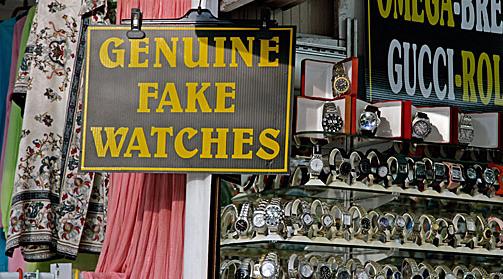
In 1972 an enormously successful marketing campaign was released for Memorex Cassette tapes. The commercial showed Ella Fitzgerald holding steady a very high note that caused a wine glass to shatter after a few seconds. The camera would switch views then to a tape recorder. Then a voice came on that said, “Is it live, or is it Memorex?” Of course, the point was that the “fake” or recorded voice on Memorex tapes was just as real – or, authentic – as the live soprano voice. Was it, really? I think I would prefer the authentic Ms. Fitzgerald.
—————————————————————————————-

Introducing The Micro-Training™ Platform
Think “University meets YouTube“
Online video training nuggets for $1.99 per person/month
—————————————————————————————-
In 1969, Coca Cola launched a new slogan, “It’s the real thing.” Competitor brands were coming into their own, challenging Coke’s ownership of the soft drink market. While all those other brands were also colas, Coke was reminding us that if you wanted “real” cola, then Coca Cola should be your choice. A few years later, “New Coke” was added to the brand, with poor results. People wanted their “real” Coke, not an updated version. As a result, classic Coke made a comeback. Was new Coke any less real than classic Coke? Of course not. It had even surpassed classic Coke in taste tests. But in a lot of consumers’ minds, it was not the authentic Coke and, therefore, not as good.
These days, we can get a lot of “fake” in our world. There are fake diamonds, fake furs, fake sugar, fake designer purses, fake leather, and much more. Sadly, there are also some fake people. Well, perhaps they are real people with skin and bones, but they aren’t authentic in their demeanor or in their interactions with others.
There are many cultural factors that impact our authenticity. From the time we start learning behaviors as very young children, we are told that we shouldn’t do or say certain things, especially in front of other people. We learn to hide our authentic selves behind a mask. We, ourselves, likely believe that a person in a certain position should act a certain way. There is also a fear linked to inauthenticity. We are afraid of what people might think if they saw our real selves.
In truth, there is nothing more valuable than our authenticity that we can give to others.
Being genuine, sincere, compassionate, and even flawed helps people see that perfection is not the end-all goal. It is impossible to be perfect. It is possible to be authentic.
In “Be Yourself, Everyone Else Is Already Taken,” Mike Robbins writes about barriers to authenticity and how we allow those barriers to be formed in our psyche but evens or people around us. He then introduces five principles for us to put into practice that will help us to, or maintain, authenticity:
- Know yourself
- Transform you fear
- Express yourself
- Be bold
- Celebrate who you are
Authenticity can be liberating for you. It can also be liberating for those around you. An authentic person doesn’t put on airs, understands perceptions, and is genuine in their interactions with others. Wouldn’t you rather deal with an honest relationship, than one in which someone is a phony?
What about you? Are you authentic? Do you act like the person you are or the person you are expected to be?
What barriers to authenticity have you seen?
Image Source danheller.com

Interesting blog. I found the link through LinkedIn.
In answer to your questions:
Am I authentic?
I try to be authentic to who I am trying to be. Confusing enough for you? I guess that’s my long way of saying, “Yes, I am authentic to myself.”
What barriers to authenticity have I seen?
That’s the interesting question, isn’t it? I’d argue that societal pressures play the largest factor in the lack of authenticity of the homogenized masses. As you state in your entry, society starts exerting these pressures on us at an early age, and it continues throughout our educational system, which encourages sameness and was designed, according to my research, to churn out factory workers.
Haven’t you found that the people who grew up outside of the system are the most authentic? I have.
In short, our society rewards sameness and damns authenticity or uniqueness, with the rare exception that we like to celebrate (as long as they’re a celebrity and not in real life).
Television also helps keep us non-authentic. I mean, if we’re all seeing the same stories, how many unique lessons can we learn?
I’m sure there are many other factors also.
Just my thoughts… Thanks for asking.
Take care,
Robert Hernandez
Your Friendly Neighborhood Offcierge
Robert- Thank you for stopping by L2L and for commenting on my post. Your response helps identify the complexities around being authentic. It is not a simply topic, for certain. I appreciate your thoughts! El